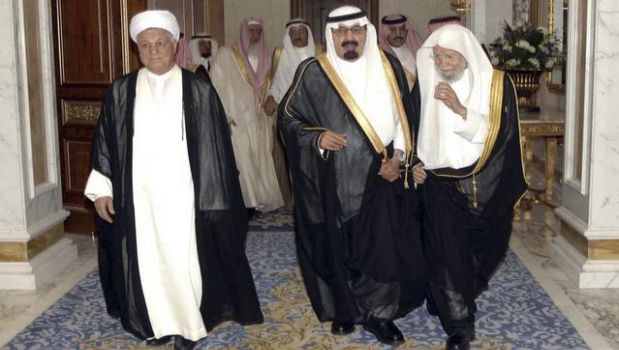Akbar Hashemi Rafsanjani is one of the very few Iranian political figures who have had good relations with Saudi Arabia’s leaders. In an interview with the Financial Times on November 26, he said that he was ready to travel to Riyadh and that he had been invited by King Abdullah to perform last month’s Hajj. His intention would be “to reassure the Saudis that friendship with Iran benefits the region and both countries.”
But Iran’s leaders first needed to agree on policies of de-escalation. A future trip needed preparation and a decision within Iran on how they were going to deal with Saudi Arabia in a mutually beneficial manner.
I remember that during and after the Iraq–Iran War relations between Iran and Saudi Arabia deteriorated, and it led to mistrust and animosity between the two sides. Back then, Saddam was claiming that the war was between Magog (a barbarian horde) and the Arabs. And then, when he occupied Kuwait, he claimed that the Kuwaitis—including the Al Sabah family—are not Arab, but rather dukhala (non-Arab intruders).
Back then, King Abdullah met Hashemi Rafsanjani in Senegal, and then in Pakistan. These meetings marked the beginning of a new chapter for Iran and Saudi Arabia. Both leaders decided to renew and strengthen the relationship between these two important Middle Eastern countries.
On the role Hashemi Rafsanjani can play in securing Arab countries’ trust towards Iran, let me remind you of the history of warm relations between Hashemi Rafsanjani and King Abdullah. This started from the Islamic Countries Conference Summit in Islamabad, Pakistan in 1995. It was after this meeting that bilateral ties considerably improved and during Khatami’s presidency a security pact was signed between the two countries.
Cooperation between Iran and Saudi Arabia would facilitate solutions for Syria, Yemen, Lebanon, Palestine and Iraq. There may be differences between the two countries and their Sunni and Shi’a approaches, but these are not unresolvable.
Dr. Mohammad Ali Hadi, Iran’s Ambassador to Riyadh during Hashemi Rafsanjani’s time, said in an interview with Saudi Arabian media that Iran and Saudi Arabia could be—and should be—the two strong wings of the Islamic world. In addition, he said that Iran and Saudi Arabia, as the two wings of Islam, could not fly in the absence of the other.
It is clear that whenever there was some cloud between two countries, the problems in the region were intensified. On the other hand, when the two countries decided to resolve their problems and did their best to attain their common goals, it benefited both of their governments and nations.
We should realize that politics is not rigid, like a stone, but rather flexible, like a net. After the Geneva P5+1 agreement with Iran, I think this is now the right time to renew the relations among the countries in the region, and adopt a new approach.
We have to focus on what would benefit the Islamic world. Israel has been far from happy with the recent Geneva agreement. James Carafano—vice-president, Foreign and Defense Policy Studies and Director of the Kathryn and Shelby Cullom Davis Institute for International Studies at the Heritage Foundation and a pro-Israel writer—compared Iran’s nuclear deal to the Munich agreement of 1938.
On the other hand, one of my dear friends in our own newspaper wrote an article in which he compared the Geneva agreement to 9/11.
Israel wanted to be a second America in the region. Now that their dream has been destroyed, the Israelis have been stressing the danger of Iran for the region more than ever before. They have even started to claim that the Arab countries in the region support Israel on this.
This, as Qur’an says, is fitna (chaos).
What we have to take into consideration here is that Israel possesses nuclear weapons, keeps extending its Jewish settlements in Palestine, and exaggerates the danger of Iran. Above all, it says that it is defending the right of the region and Arab countries. Who could possibly believe that?
Hashemi Rafsanjani stated that Israel, as a small fish, cannot eat a big fish. This means the scenario of a new Middle East in the Israeli dream is not going to work. This is really the time for all Islamic countries to focus on Palestine. As we know, Israel has a plan to make the world forget about Palestine, and it into a forgotten issue.
Saudi Arabia and Iran can not only move past the obstacles and problems between them, but they could also revive the key issue of Palestine. I am optimistic President Obama and his administration are looking at the far horizon, and they would not do as George W. Bush did. Obama wants to be remembered as a remarkable man in history. He was the key figure behind the Geneva agreement, and he might be the right person to establish the real state of Palestine.
This is not a dream. It will happen, but it needs Iran’s and Saudi Arabia’s support. Fifty-five years ago, Hashemi Rafsanjani published a book about Palestine. Back then, he was arrested and tortured because of Palestine. Perhaps through the strengthening of relations between Iran and Saudi Arabia, the dream of both leaders and nations—an independent and real state of Palestine—will come true. The UN has named 2014 the Year of Solidarity with the Palestinian People. The resolution was adopted by the majority of member states, with 110 voting in favor, seven opposed and 54 abstaining. The new year has become the best time to focus on Palestine.

Trackbacks/Pingbacks